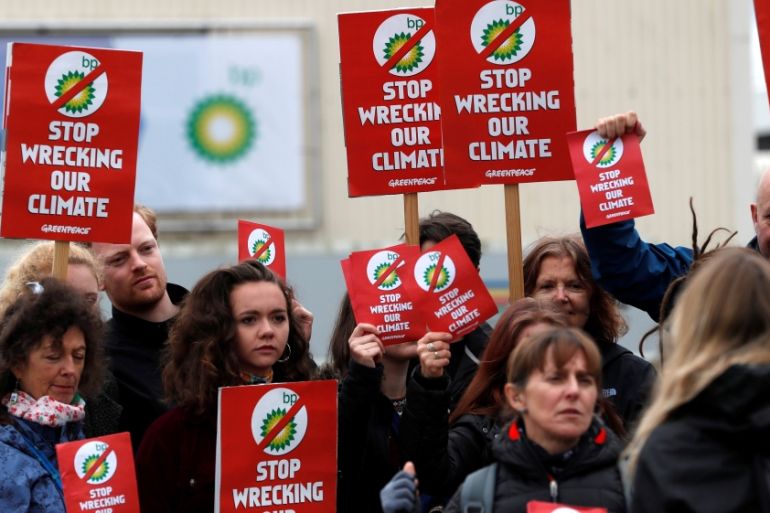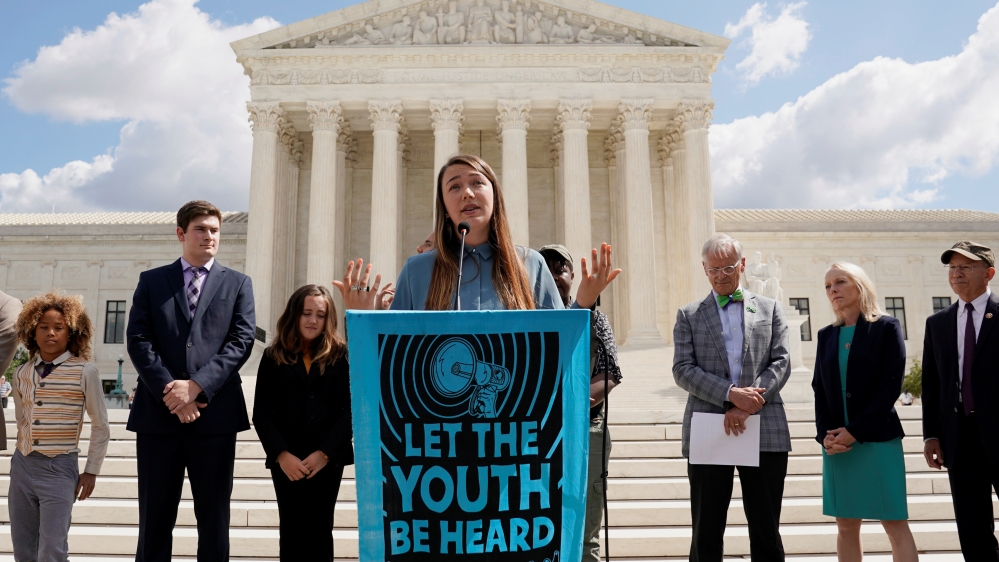Human rights groups take climate fight to big corporations
Peoples’ Summit issues landmark declaration in New York, unleashing new resources to wage financial and legal campaign.

While climate advocacy groups have long relied on environmental arguments for why fossil fuels should be sidelined, a paradigm shift appears to be taking place.
Not only are ecological activists stressing the impact that greenhouse gas emissions have on the Earth, but now they are also invoking human rights law to wage an epic battle against the carbon-centric status quo.
Keep reading
list of 4 itemsUS sanctions two RSF commanders as fighting escalates in Sudan’s Darfur
The Lost Souls of Syria – Part 1
Is the US shipping weapons to Israel tacit support for its war on Gaza?
More than 200 representatives of indigenous peoples, labour groups, legal bodies and environmental organisations issued a historic declaration on Wednesday merging human rights with climate justice.
Adopted in advance of the Climate Action Summit convening next week during the United Nations General Assembly, the statement of principles is backed by Amnesty International and Greenpeace International, in conjunction with UN human rights officials and several international law centres.
The groups that converged in New York City at the Peoples’ Summit on Climate, Rights and Human Survival aspire to force corporations – and governments – to deal promptly with the climate emergency.
“The climate crisis is a human rights crisis,” said Jennifer Morgan, international executive director at Greenpeace International.
“The human consequences of extreme weather disasters can be staggering, as we can see by the profound devastation and destruction left in the wake of Hurricane Dorian,” Morgan said.
“Weak governments and toxic corporate power will have nowhere to hide as we put people at the centre of our demands,” she added.
‘Follow the money’
Wednesday’s declaration seeks to lace together international human rights law, climate change and the financial impact for companies and societies failing to meet commitments to help reverse global warming.
The groups resolved to pursue strategic litigation efforts and punish the financial sector’s fossil fuel investments, as well as use human rights accountability mechanisms and mass mobilisation campaigns.
“We must build power,” said Ellen Dorsey, executive director of the Wallace Global Fund, a private foundation focused on progressive social change and an organiser of the Peoples’ Summit.
Dorsey cited the need for a “rights-respecting economy that puts people, not profits, at the centre”. She also said that climate solutions need to be “commensurate with the scale and scope of the problem”.
She said international environmental organisation 350.org’s announcement last week that institutional investors and other groups have committed to divest $11 trillion from fossil fuels is an indication that the climate justice movement is headed in the right direction.
“Follow the money, tackle the money, and flex some financial and economic power,” said Dorsey, explaining the connection between corporate decisions and vulnerable communities.
“People on the front lines don’t need to be convinced of the [lack of] distinction between climate and human rights,” Dorsey added. “They live it every day.”

Yet the climate crisis is not an accident of nature, said Craig Mokhiber, director of the New York Office of the UN’s High Commissioner for Human Rights. He also described the convergence of the human rights and climate causes as a “marriage of movements”.
Mokhiber said Wednesday’s declaration was aimed at “choices made in the public and private sphere” that have a bearing on people and the planet.
“Every state has obligations in international law not just to refrain from doing something, but to actively protect against harms,” he said. “Human beings have standing in court, and the right to claim those rights.”
Adding that climate advocates would seize upon a “spectrum of tactics from action in court to civil disobedience in the streets”, Mokhiber said the might of the UN would back the effort.
‘Invest one cent more’
Kumi Naidoo, the secretary-general of Amnesty International, urged environmental advocates to convey a bold message to the leadership of fossil-fuel companies.
“They need to understand that we are now going to be using the full weight of human rights law, in terms of coming after them,” said Naidoo.
“Any decision now to invest – one cent more – is an investment in the death of our children and their children,” he added. “There is no question about the science any more.”
Naidoo said strategic litigation against oil and gas companies for their contributions to climate change will take time to play out in the legal system, and that jurisdictional issues could also plague the court fights.
However, he expressed confidence that lawsuits would raise public awareness and mobilise activists.
“With legal risk comes financial risk,” Naidoo said. “The financial sector is slowly waking up to this reality.”